Patient Attitudes Towards Bowel Cancer Screening: A UK Perspective
VerifiedAdded on 2020/06/06
|8
|2317
|61
AI Summary
Bowel Cancer Screening is crucial for early detection and treatment of bowel cancer, especially among individuals aged 50-74. Despite its life-saving potential, participation rates remain low due to factors such as perceived invasiveness and lack of awareness. This paper highlights the effectiveness of nurse-led services in improving screening uptake and discusses how folic acid supplementation could reduce colorectal cancer risk. Additionally, it explores the psychological barriers that affect patient attitudes towards screening in the UK. By understanding these elements, healthcare providers can enhance screening programs to prevent bowel cancer effectively.

Physiology Questions
Paraphrase This Document
Need a fresh take? Get an instant paraphrase of this document with our AI Paraphraser
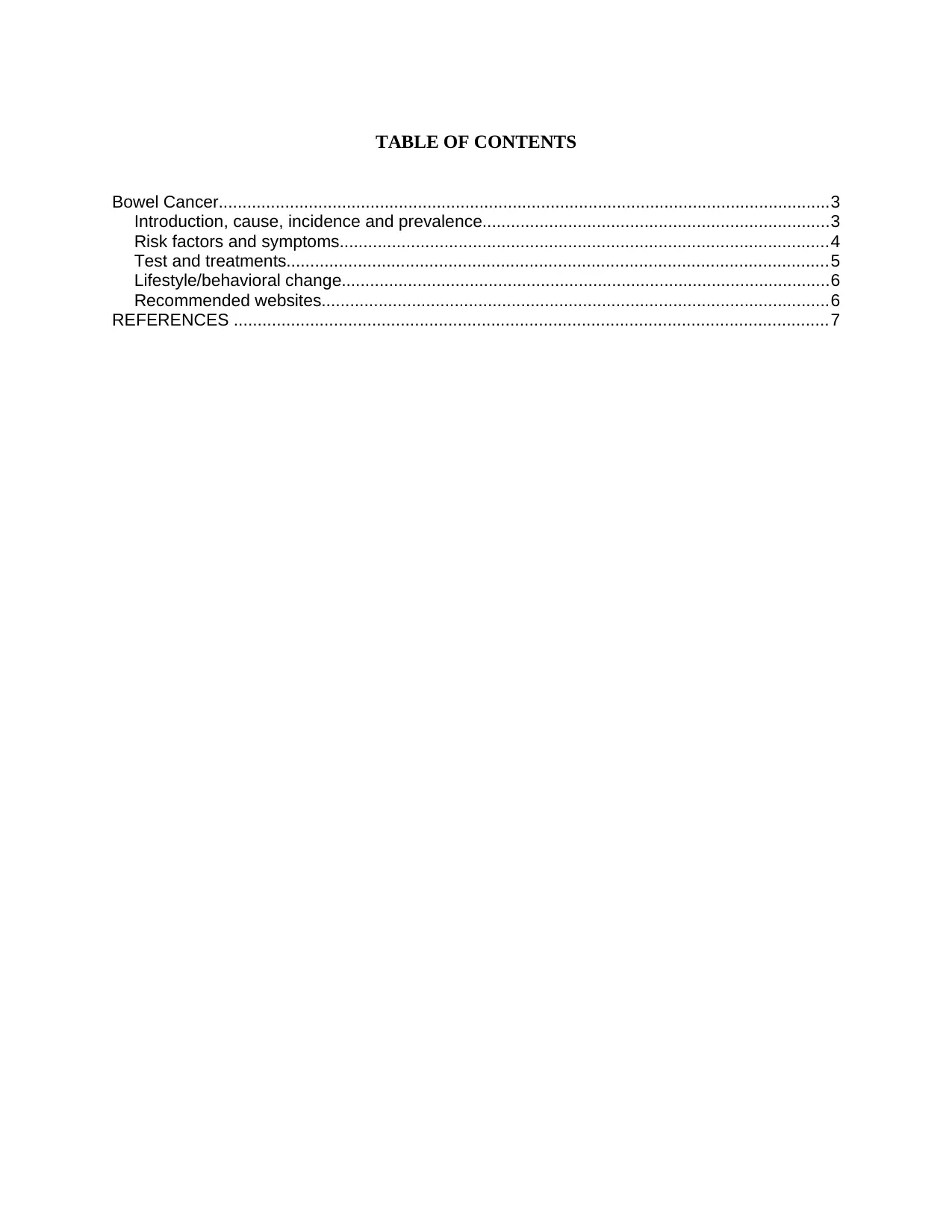
TABLE OF CONTENTS
Bowel Cancer.................................................................................................................................3
Introduction, cause, incidence and prevalence.........................................................................3
Risk factors and symptoms.......................................................................................................4
Test and treatments..................................................................................................................5
Lifestyle/behavioral change.......................................................................................................6
Recommended websites...........................................................................................................6
REFERENCES .............................................................................................................................7
Bowel Cancer.................................................................................................................................3
Introduction, cause, incidence and prevalence.........................................................................3
Risk factors and symptoms.......................................................................................................4
Test and treatments..................................................................................................................5
Lifestyle/behavioral change.......................................................................................................6
Recommended websites...........................................................................................................6
REFERENCES .............................................................................................................................7
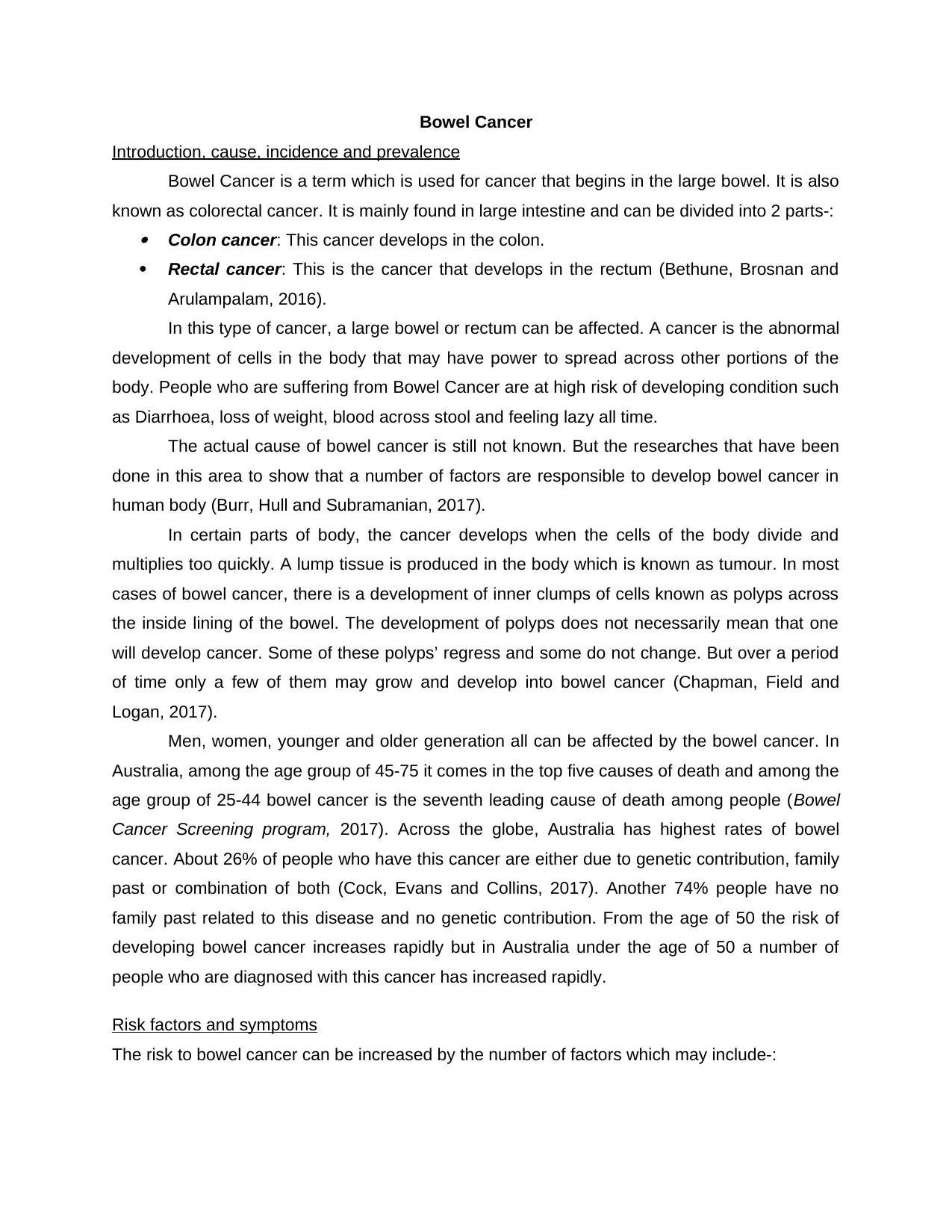
Bowel Cancer
Introduction, cause, incidence and prevalence
Bowel Cancer is a term which is used for cancer that begins in the large bowel. It is also
known as colorectal cancer. It is mainly found in large intestine and can be divided into 2 parts-: Colon cancer: This cancer develops in the colon.
Rectal cancer: This is the cancer that develops in the rectum (Bethune, Brosnan and
Arulampalam, 2016).
In this type of cancer, a large bowel or rectum can be affected. A cancer is the abnormal
development of cells in the body that may have power to spread across other portions of the
body. People who are suffering from Bowel Cancer are at high risk of developing condition such
as Diarrhoea, loss of weight, blood across stool and feeling lazy all time.
The actual cause of bowel cancer is still not known. But the researches that have been
done in this area to show that a number of factors are responsible to develop bowel cancer in
human body (Burr, Hull and Subramanian, 2017).
In certain parts of body, the cancer develops when the cells of the body divide and
multiplies too quickly. A lump tissue is produced in the body which is known as tumour. In most
cases of bowel cancer, there is a development of inner clumps of cells known as polyps across
the inside lining of the bowel. The development of polyps does not necessarily mean that one
will develop cancer. Some of these polyps’ regress and some do not change. But over a period
of time only a few of them may grow and develop into bowel cancer (Chapman, Field and
Logan, 2017).
Men, women, younger and older generation all can be affected by the bowel cancer. In
Australia, among the age group of 45-75 it comes in the top five causes of death and among the
age group of 25-44 bowel cancer is the seventh leading cause of death among people (Bowel
Cancer Screening program, 2017). Across the globe, Australia has highest rates of bowel
cancer. About 26% of people who have this cancer are either due to genetic contribution, family
past or combination of both (Cock, Evans and Collins, 2017). Another 74% people have no
family past related to this disease and no genetic contribution. From the age of 50 the risk of
developing bowel cancer increases rapidly but in Australia under the age of 50 a number of
people who are diagnosed with this cancer has increased rapidly.
Risk factors and symptoms
The risk to bowel cancer can be increased by the number of factors which may include-:
Introduction, cause, incidence and prevalence
Bowel Cancer is a term which is used for cancer that begins in the large bowel. It is also
known as colorectal cancer. It is mainly found in large intestine and can be divided into 2 parts-: Colon cancer: This cancer develops in the colon.
Rectal cancer: This is the cancer that develops in the rectum (Bethune, Brosnan and
Arulampalam, 2016).
In this type of cancer, a large bowel or rectum can be affected. A cancer is the abnormal
development of cells in the body that may have power to spread across other portions of the
body. People who are suffering from Bowel Cancer are at high risk of developing condition such
as Diarrhoea, loss of weight, blood across stool and feeling lazy all time.
The actual cause of bowel cancer is still not known. But the researches that have been
done in this area to show that a number of factors are responsible to develop bowel cancer in
human body (Burr, Hull and Subramanian, 2017).
In certain parts of body, the cancer develops when the cells of the body divide and
multiplies too quickly. A lump tissue is produced in the body which is known as tumour. In most
cases of bowel cancer, there is a development of inner clumps of cells known as polyps across
the inside lining of the bowel. The development of polyps does not necessarily mean that one
will develop cancer. Some of these polyps’ regress and some do not change. But over a period
of time only a few of them may grow and develop into bowel cancer (Chapman, Field and
Logan, 2017).
Men, women, younger and older generation all can be affected by the bowel cancer. In
Australia, among the age group of 45-75 it comes in the top five causes of death and among the
age group of 25-44 bowel cancer is the seventh leading cause of death among people (Bowel
Cancer Screening program, 2017). Across the globe, Australia has highest rates of bowel
cancer. About 26% of people who have this cancer are either due to genetic contribution, family
past or combination of both (Cock, Evans and Collins, 2017). Another 74% people have no
family past related to this disease and no genetic contribution. From the age of 50 the risk of
developing bowel cancer increases rapidly but in Australia under the age of 50 a number of
people who are diagnosed with this cancer has increased rapidly.
Risk factors and symptoms
The risk to bowel cancer can be increased by the number of factors which may include-:
⊘ This is a preview!⊘
Do you want full access?
Subscribe today to unlock all pages.

Trusted by 1+ million students worldwide
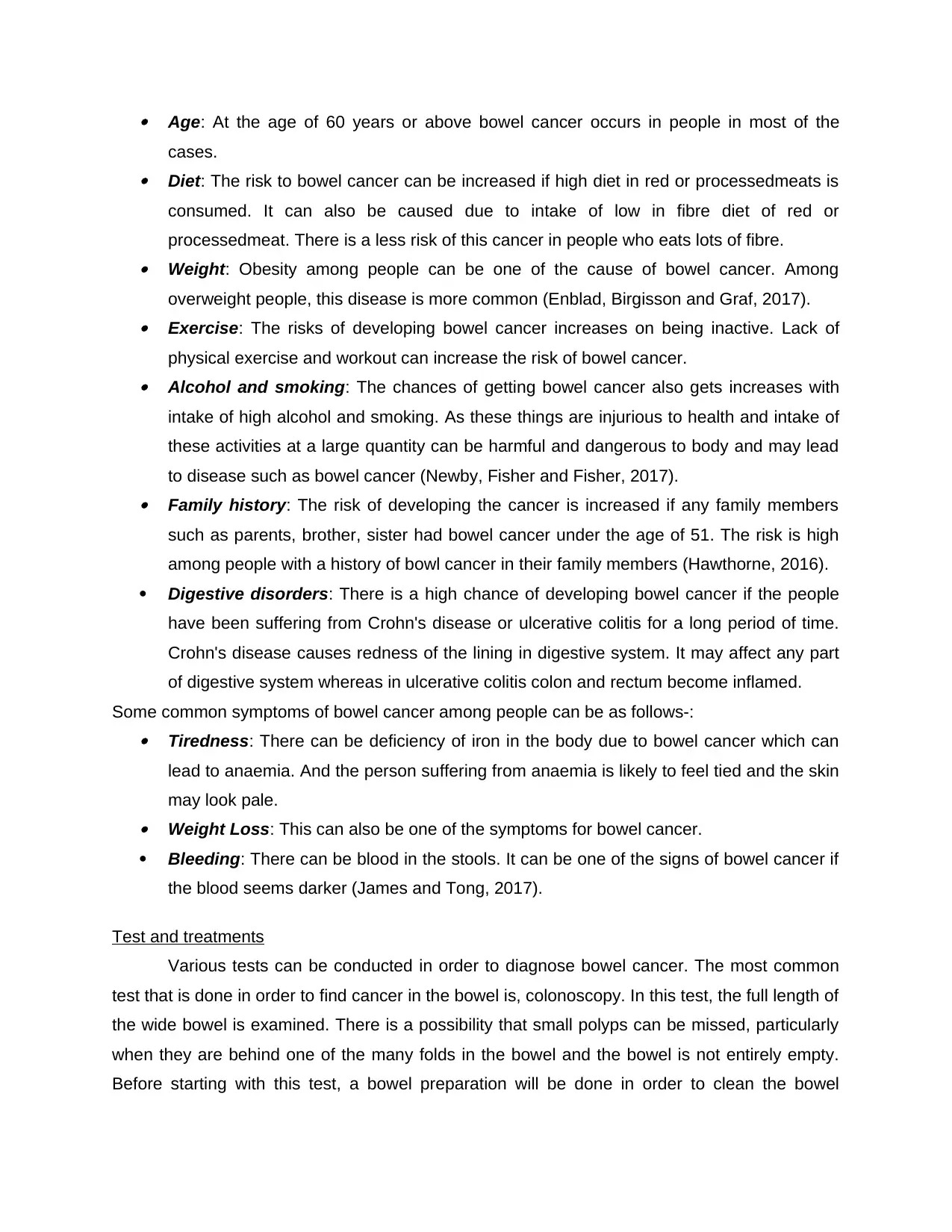
Age: At the age of 60 years or above bowel cancer occurs in people in most of the
cases. Diet: The risk to bowel cancer can be increased if high diet in red or processedmeats is
consumed. It can also be caused due to intake of low in fibre diet of red or
processedmeat. There is a less risk of this cancer in people who eats lots of fibre. Weight: Obesity among people can be one of the cause of bowel cancer. Among
overweight people, this disease is more common (Enblad, Birgisson and Graf, 2017). Exercise: The risks of developing bowel cancer increases on being inactive. Lack of
physical exercise and workout can increase the risk of bowel cancer. Alcohol and smoking: The chances of getting bowel cancer also gets increases with
intake of high alcohol and smoking. As these things are injurious to health and intake of
these activities at a large quantity can be harmful and dangerous to body and may lead
to disease such as bowel cancer (Newby, Fisher and Fisher, 2017). Family history: The risk of developing the cancer is increased if any family members
such as parents, brother, sister had bowel cancer under the age of 51. The risk is high
among people with a history of bowl cancer in their family members (Hawthorne, 2016).
Digestive disorders: There is a high chance of developing bowel cancer if the people
have been suffering from Crohn's disease or ulcerative colitis for a long period of time.
Crohn's disease causes redness of the lining in digestive system. It may affect any part
of digestive system whereas in ulcerative colitis colon and rectum become inflamed.
Some common symptoms of bowel cancer among people can be as follows-: Tiredness: There can be deficiency of iron in the body due to bowel cancer which can
lead to anaemia. And the person suffering from anaemia is likely to feel tied and the skin
may look pale. Weight Loss: This can also be one of the symptoms for bowel cancer.
Bleeding: There can be blood in the stools. It can be one of the signs of bowel cancer if
the blood seems darker (James and Tong, 2017).
Test and treatments
Various tests can be conducted in order to diagnose bowel cancer. The most common
test that is done in order to find cancer in the bowel is, colonoscopy. In this test, the full length of
the wide bowel is examined. There is a possibility that small polyps can be missed, particularly
when they are behind one of the many folds in the bowel and the bowel is not entirely empty.
Before starting with this test, a bowel preparation will be done in order to clean the bowel
cases. Diet: The risk to bowel cancer can be increased if high diet in red or processedmeats is
consumed. It can also be caused due to intake of low in fibre diet of red or
processedmeat. There is a less risk of this cancer in people who eats lots of fibre. Weight: Obesity among people can be one of the cause of bowel cancer. Among
overweight people, this disease is more common (Enblad, Birgisson and Graf, 2017). Exercise: The risks of developing bowel cancer increases on being inactive. Lack of
physical exercise and workout can increase the risk of bowel cancer. Alcohol and smoking: The chances of getting bowel cancer also gets increases with
intake of high alcohol and smoking. As these things are injurious to health and intake of
these activities at a large quantity can be harmful and dangerous to body and may lead
to disease such as bowel cancer (Newby, Fisher and Fisher, 2017). Family history: The risk of developing the cancer is increased if any family members
such as parents, brother, sister had bowel cancer under the age of 51. The risk is high
among people with a history of bowl cancer in their family members (Hawthorne, 2016).
Digestive disorders: There is a high chance of developing bowel cancer if the people
have been suffering from Crohn's disease or ulcerative colitis for a long period of time.
Crohn's disease causes redness of the lining in digestive system. It may affect any part
of digestive system whereas in ulcerative colitis colon and rectum become inflamed.
Some common symptoms of bowel cancer among people can be as follows-: Tiredness: There can be deficiency of iron in the body due to bowel cancer which can
lead to anaemia. And the person suffering from anaemia is likely to feel tied and the skin
may look pale. Weight Loss: This can also be one of the symptoms for bowel cancer.
Bleeding: There can be blood in the stools. It can be one of the signs of bowel cancer if
the blood seems darker (James and Tong, 2017).
Test and treatments
Various tests can be conducted in order to diagnose bowel cancer. The most common
test that is done in order to find cancer in the bowel is, colonoscopy. In this test, the full length of
the wide bowel is examined. There is a possibility that small polyps can be missed, particularly
when they are behind one of the many folds in the bowel and the bowel is not entirely empty.
Before starting with this test, a bowel preparation will be done in order to clean the bowel
Paraphrase This Document
Need a fresh take? Get an instant paraphrase of this document with our AI Paraphraser
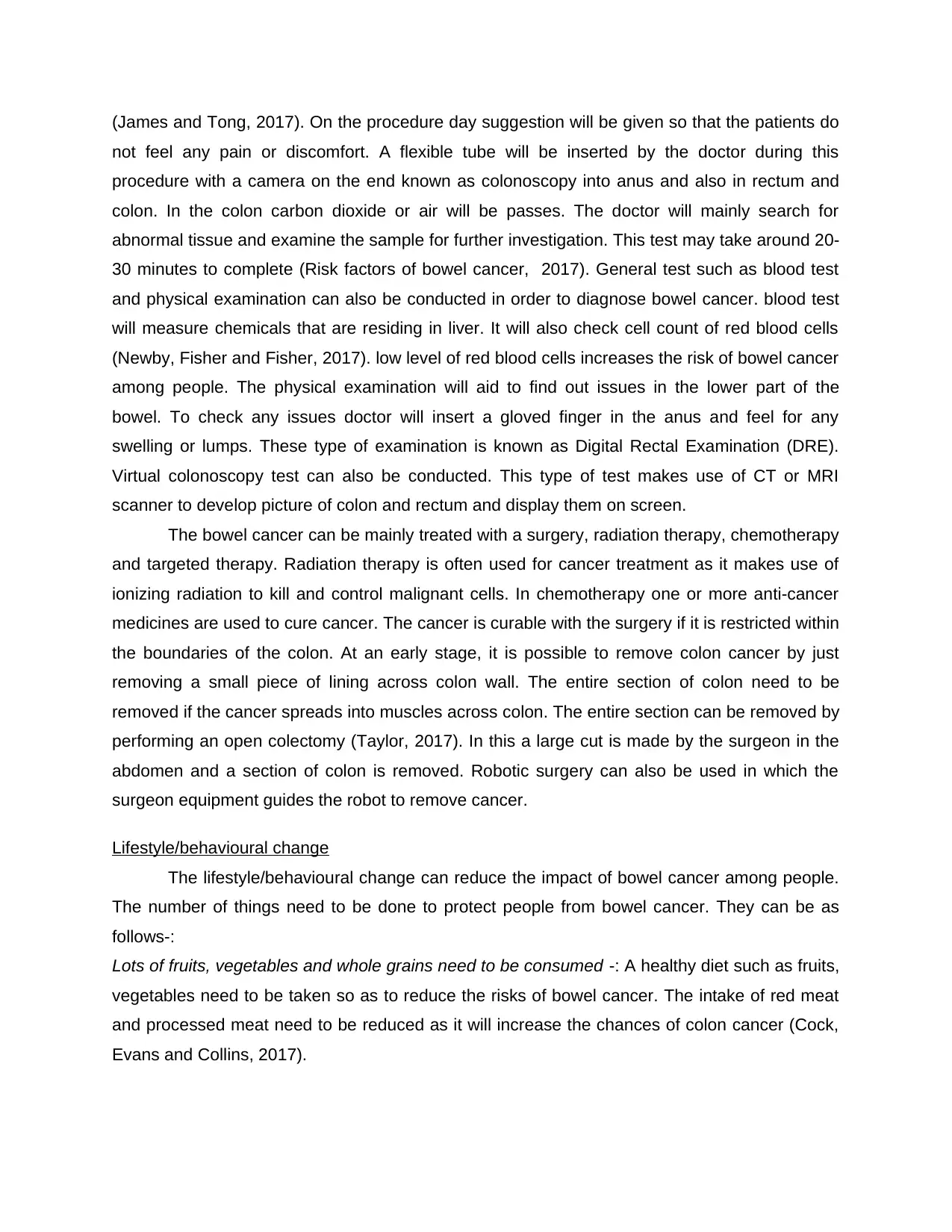
(James and Tong, 2017). On the procedure day suggestion will be given so that the patients do
not feel any pain or discomfort. A flexible tube will be inserted by the doctor during this
procedure with a camera on the end known as colonoscopy into anus and also in rectum and
colon. In the colon carbon dioxide or air will be passes. The doctor will mainly search for
abnormal tissue and examine the sample for further investigation. This test may take around 20-
30 minutes to complete (Risk factors of bowel cancer, 2017). General test such as blood test
and physical examination can also be conducted in order to diagnose bowel cancer. blood test
will measure chemicals that are residing in liver. It will also check cell count of red blood cells
(Newby, Fisher and Fisher, 2017). low level of red blood cells increases the risk of bowel cancer
among people. The physical examination will aid to find out issues in the lower part of the
bowel. To check any issues doctor will insert a gloved finger in the anus and feel for any
swelling or lumps. These type of examination is known as Digital Rectal Examination (DRE).
Virtual colonoscopy test can also be conducted. This type of test makes use of CT or MRI
scanner to develop picture of colon and rectum and display them on screen.
The bowel cancer can be mainly treated with a surgery, radiation therapy, chemotherapy
and targeted therapy. Radiation therapy is often used for cancer treatment as it makes use of
ionizing radiation to kill and control malignant cells. In chemotherapy one or more anti-cancer
medicines are used to cure cancer. The cancer is curable with the surgery if it is restricted within
the boundaries of the colon. At an early stage, it is possible to remove colon cancer by just
removing a small piece of lining across colon wall. The entire section of colon need to be
removed if the cancer spreads into muscles across colon. The entire section can be removed by
performing an open colectomy (Taylor, 2017). In this a large cut is made by the surgeon in the
abdomen and a section of colon is removed. Robotic surgery can also be used in which the
surgeon equipment guides the robot to remove cancer.
Lifestyle/behavioural change
The lifestyle/behavioural change can reduce the impact of bowel cancer among people.
The number of things need to be done to protect people from bowel cancer. They can be as
follows-:
Lots of fruits, vegetables and whole grains need to be consumed -: A healthy diet such as fruits,
vegetables need to be taken so as to reduce the risks of bowel cancer. The intake of red meat
and processed meat need to be reduced as it will increase the chances of colon cancer (Cock,
Evans and Collins, 2017).
not feel any pain or discomfort. A flexible tube will be inserted by the doctor during this
procedure with a camera on the end known as colonoscopy into anus and also in rectum and
colon. In the colon carbon dioxide or air will be passes. The doctor will mainly search for
abnormal tissue and examine the sample for further investigation. This test may take around 20-
30 minutes to complete (Risk factors of bowel cancer, 2017). General test such as blood test
and physical examination can also be conducted in order to diagnose bowel cancer. blood test
will measure chemicals that are residing in liver. It will also check cell count of red blood cells
(Newby, Fisher and Fisher, 2017). low level of red blood cells increases the risk of bowel cancer
among people. The physical examination will aid to find out issues in the lower part of the
bowel. To check any issues doctor will insert a gloved finger in the anus and feel for any
swelling or lumps. These type of examination is known as Digital Rectal Examination (DRE).
Virtual colonoscopy test can also be conducted. This type of test makes use of CT or MRI
scanner to develop picture of colon and rectum and display them on screen.
The bowel cancer can be mainly treated with a surgery, radiation therapy, chemotherapy
and targeted therapy. Radiation therapy is often used for cancer treatment as it makes use of
ionizing radiation to kill and control malignant cells. In chemotherapy one or more anti-cancer
medicines are used to cure cancer. The cancer is curable with the surgery if it is restricted within
the boundaries of the colon. At an early stage, it is possible to remove colon cancer by just
removing a small piece of lining across colon wall. The entire section of colon need to be
removed if the cancer spreads into muscles across colon. The entire section can be removed by
performing an open colectomy (Taylor, 2017). In this a large cut is made by the surgeon in the
abdomen and a section of colon is removed. Robotic surgery can also be used in which the
surgeon equipment guides the robot to remove cancer.
Lifestyle/behavioural change
The lifestyle/behavioural change can reduce the impact of bowel cancer among people.
The number of things need to be done to protect people from bowel cancer. They can be as
follows-:
Lots of fruits, vegetables and whole grains need to be consumed -: A healthy diet such as fruits,
vegetables need to be taken so as to reduce the risks of bowel cancer. The intake of red meat
and processed meat need to be reduced as it will increase the chances of colon cancer (Cock,
Evans and Collins, 2017).
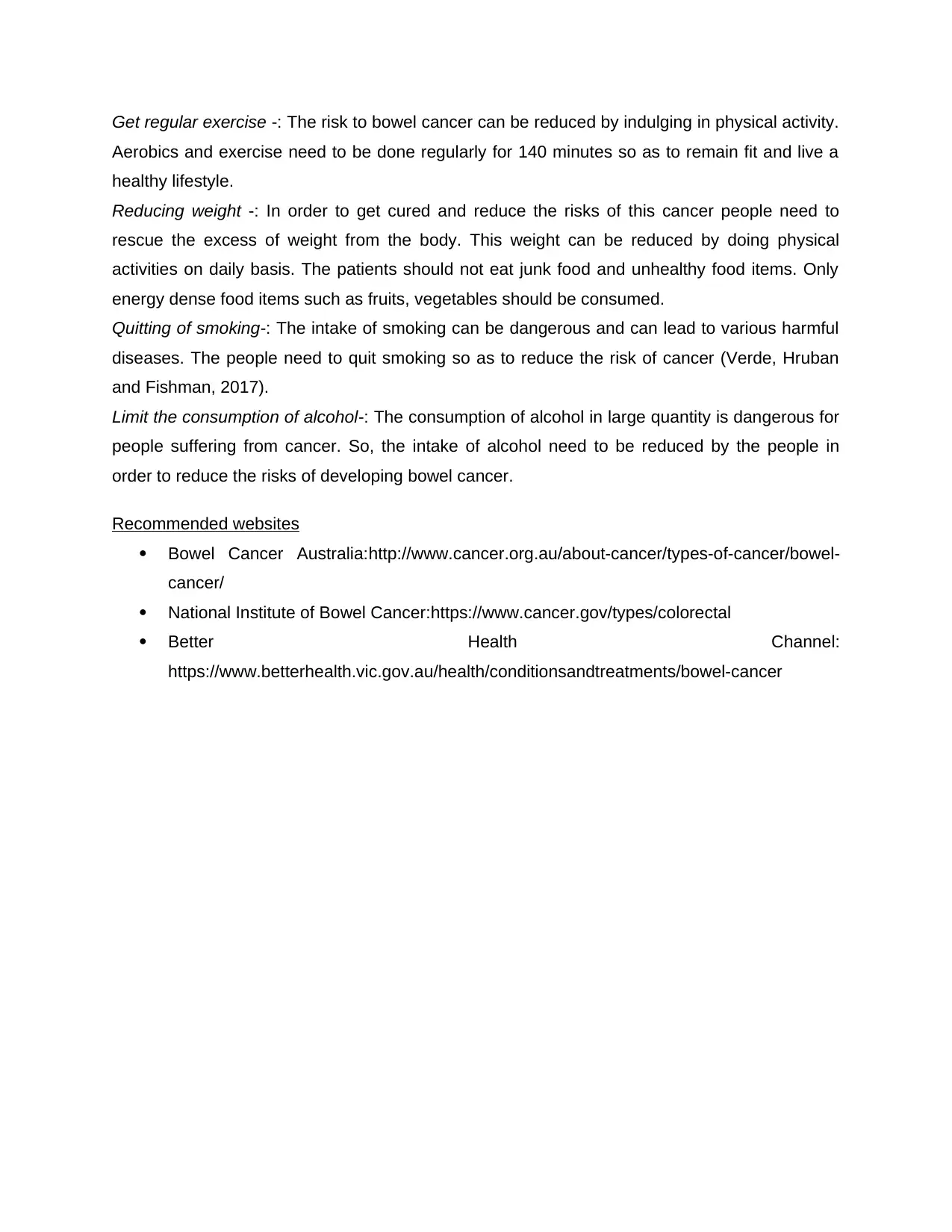
Get regular exercise -: The risk to bowel cancer can be reduced by indulging in physical activity.
Aerobics and exercise need to be done regularly for 140 minutes so as to remain fit and live a
healthy lifestyle.
Reducing weight -: In order to get cured and reduce the risks of this cancer people need to
rescue the excess of weight from the body. This weight can be reduced by doing physical
activities on daily basis. The patients should not eat junk food and unhealthy food items. Only
energy dense food items such as fruits, vegetables should be consumed.
Quitting of smoking-: The intake of smoking can be dangerous and can lead to various harmful
diseases. The people need to quit smoking so as to reduce the risk of cancer (Verde, Hruban
and Fishman, 2017).
Limit the consumption of alcohol-: The consumption of alcohol in large quantity is dangerous for
people suffering from cancer. So, the intake of alcohol need to be reduced by the people in
order to reduce the risks of developing bowel cancer.
Recommended websites
Bowel Cancer Australia:http://www.cancer.org.au/about-cancer/types-of-cancer/bowel-
cancer/
National Institute of Bowel Cancer:https://www.cancer.gov/types/colorectal
Better Health Channel:
https://www.betterhealth.vic.gov.au/health/conditionsandtreatments/bowel-cancer
Aerobics and exercise need to be done regularly for 140 minutes so as to remain fit and live a
healthy lifestyle.
Reducing weight -: In order to get cured and reduce the risks of this cancer people need to
rescue the excess of weight from the body. This weight can be reduced by doing physical
activities on daily basis. The patients should not eat junk food and unhealthy food items. Only
energy dense food items such as fruits, vegetables should be consumed.
Quitting of smoking-: The intake of smoking can be dangerous and can lead to various harmful
diseases. The people need to quit smoking so as to reduce the risk of cancer (Verde, Hruban
and Fishman, 2017).
Limit the consumption of alcohol-: The consumption of alcohol in large quantity is dangerous for
people suffering from cancer. So, the intake of alcohol need to be reduced by the people in
order to reduce the risks of developing bowel cancer.
Recommended websites
Bowel Cancer Australia:http://www.cancer.org.au/about-cancer/types-of-cancer/bowel-
cancer/
National Institute of Bowel Cancer:https://www.cancer.gov/types/colorectal
Better Health Channel:
https://www.betterhealth.vic.gov.au/health/conditionsandtreatments/bowel-cancer
⊘ This is a preview!⊘
Do you want full access?
Subscribe today to unlock all pages.

Trusted by 1+ million students worldwide
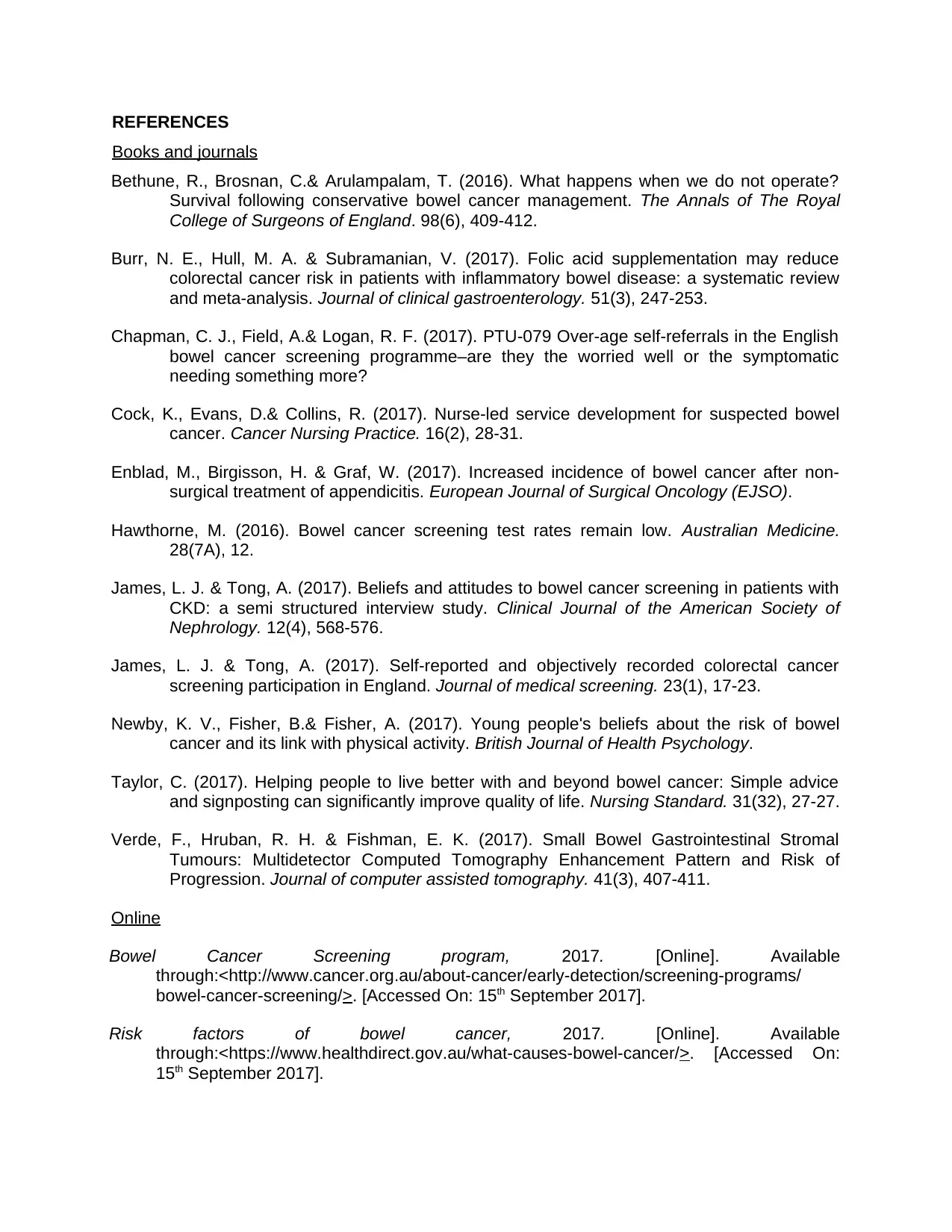
REFERENCES
Books and journals
Bethune, R., Brosnan, C.& Arulampalam, T. (2016). What happens when we do not operate?
Survival following conservative bowel cancer management. The Annals of The Royal
College of Surgeons of England. 98(6), 409-412.
Burr, N. E., Hull, M. A. & Subramanian, V. (2017). Folic acid supplementation may reduce
colorectal cancer risk in patients with inflammatory bowel disease: a systematic review
and meta-analysis. Journal of clinical gastroenterology. 51(3), 247-253.
Chapman, C. J., Field, A.& Logan, R. F. (2017). PTU-079 Over-age self-referrals in the English
bowel cancer screening programme–are they the worried well or the symptomatic
needing something more?
Cock, K., Evans, D.& Collins, R. (2017). Nurse-led service development for suspected bowel
cancer. Cancer Nursing Practice. 16(2), 28-31.
Enblad, M., Birgisson, H. & Graf, W. (2017). Increased incidence of bowel cancer after non-
surgical treatment of appendicitis. European Journal of Surgical Oncology (EJSO).
Hawthorne, M. (2016). Bowel cancer screening test rates remain low. Australian Medicine.
28(7A), 12.
James, L. J. & Tong, A. (2017). Beliefs and attitudes to bowel cancer screening in patients with
CKD: a semi structured interview study. Clinical Journal of the American Society of
Nephrology. 12(4), 568-576.
James, L. J. & Tong, A. (2017). Self-reported and objectively recorded colorectal cancer
screening participation in England. Journal of medical screening. 23(1), 17-23.
Newby, K. V., Fisher, B.& Fisher, A. (2017). Young people's beliefs about the risk of bowel
cancer and its link with physical activity. British Journal of Health Psychology.
Taylor, C. (2017). Helping people to live better with and beyond bowel cancer: Simple advice
and signposting can significantly improve quality of life. Nursing Standard. 31(32), 27-27.
Verde, F., Hruban, R. H. & Fishman, E. K. (2017). Small Bowel Gastrointestinal Stromal
Tumours: Multidetector Computed Tomography Enhancement Pattern and Risk of
Progression. Journal of computer assisted tomography. 41(3), 407-411.
Online
Bowel Cancer Screening program, 2017. [Online]. Available
through:<http://www.cancer.org.au/about-cancer/early-detection/screening-programs/
bowel-cancer-screening/>. [Accessed On: 15th September 2017].
Risk factors of bowel cancer, 2017. [Online]. Available
through:<https://www.healthdirect.gov.au/what-causes-bowel-cancer/>. [Accessed On:
15th September 2017].
Books and journals
Bethune, R., Brosnan, C.& Arulampalam, T. (2016). What happens when we do not operate?
Survival following conservative bowel cancer management. The Annals of The Royal
College of Surgeons of England. 98(6), 409-412.
Burr, N. E., Hull, M. A. & Subramanian, V. (2017). Folic acid supplementation may reduce
colorectal cancer risk in patients with inflammatory bowel disease: a systematic review
and meta-analysis. Journal of clinical gastroenterology. 51(3), 247-253.
Chapman, C. J., Field, A.& Logan, R. F. (2017). PTU-079 Over-age self-referrals in the English
bowel cancer screening programme–are they the worried well or the symptomatic
needing something more?
Cock, K., Evans, D.& Collins, R. (2017). Nurse-led service development for suspected bowel
cancer. Cancer Nursing Practice. 16(2), 28-31.
Enblad, M., Birgisson, H. & Graf, W. (2017). Increased incidence of bowel cancer after non-
surgical treatment of appendicitis. European Journal of Surgical Oncology (EJSO).
Hawthorne, M. (2016). Bowel cancer screening test rates remain low. Australian Medicine.
28(7A), 12.
James, L. J. & Tong, A. (2017). Beliefs and attitudes to bowel cancer screening in patients with
CKD: a semi structured interview study. Clinical Journal of the American Society of
Nephrology. 12(4), 568-576.
James, L. J. & Tong, A. (2017). Self-reported and objectively recorded colorectal cancer
screening participation in England. Journal of medical screening. 23(1), 17-23.
Newby, K. V., Fisher, B.& Fisher, A. (2017). Young people's beliefs about the risk of bowel
cancer and its link with physical activity. British Journal of Health Psychology.
Taylor, C. (2017). Helping people to live better with and beyond bowel cancer: Simple advice
and signposting can significantly improve quality of life. Nursing Standard. 31(32), 27-27.
Verde, F., Hruban, R. H. & Fishman, E. K. (2017). Small Bowel Gastrointestinal Stromal
Tumours: Multidetector Computed Tomography Enhancement Pattern and Risk of
Progression. Journal of computer assisted tomography. 41(3), 407-411.
Online
Bowel Cancer Screening program, 2017. [Online]. Available
through:<http://www.cancer.org.au/about-cancer/early-detection/screening-programs/
bowel-cancer-screening/>. [Accessed On: 15th September 2017].
Risk factors of bowel cancer, 2017. [Online]. Available
through:<https://www.healthdirect.gov.au/what-causes-bowel-cancer/>. [Accessed On:
15th September 2017].
Paraphrase This Document
Need a fresh take? Get an instant paraphrase of this document with our AI Paraphraser

1 out of 8
Related Documents
Your All-in-One AI-Powered Toolkit for Academic Success.
+13062052269
info@desklib.com
Available 24*7 on WhatsApp / Email
![[object Object]](/_next/static/media/star-bottom.7253800d.svg)
Unlock your academic potential
Copyright © 2020–2025 A2Z Services. All Rights Reserved. Developed and managed by ZUCOL.





